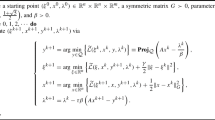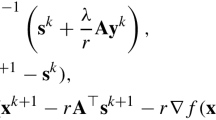Abstract
The recently proposed iterative sparsification projection (ISP), a fast and robust sparse signal recovery algorithm framework, can be classified as smooth-ISP and nonsmooth-ISP. However, no convergence analysis has been established for the nonsmooth-ISP in the previous works. Motivated by this absence, the present paper provides a convergence analysis for ISP with soft-thresholding (ISP-soft) which is an instance of the nonsmooth-ISP. In our analysis, the composite operator of soft-thresholding and proximal projection is viewed as a fixed point mapping, whose nonexpansiveness plays a key role. Specifically, our convergence analysis for the sequence generated by ISP-soft can be summarized as follows: 1) For each inner loop, we prove that the sequence has a unique accumulation point which is a fixed point, and show that it is a Cauchy sequence; 2) for the last inner loop, we prove that the accumulation point of the sequence is a critical point of the objective function if the final value of the threshold satisfies a condition, and show that the corresponding objective values are monotonically nonincreasing. A numerical experiment is given to validate some of our results and intuitively present the convergence.


Similar content being viewed by others
Notes
Generally, under the case where \(J({\mathbf {x}})=\Vert {\mathbf {x}}\Vert _{1}\), problem (2) is equivalently reformulated as an unconstrained regularized optimization, termed basis pursuit denoising (BPDN).
The smooth version of (2) means that \(J(\cdot )\) is replaced by its smooth approximation.
In Algorithm 1, \({\mathbf {A}}^{\dagger }\) denotes the Moore–Penrose pseudo-inverse of \({\mathbf {A}}\), and other initial values for \({\mathbf {x}}\) can also be used.
We did multiple trials in our experiment, but only present the results of one trial, since in each trial we observed similar results.
References
Donoho, D.L.: Compressed sensing. IEEE Trans. Inf. Theory 52(4), 1289–1306 (2006)
Ranjan, S., Vidyasagar, M.: Tight performance bounds for compressed sensing with conventional and group sparsity. IEEE Tran. Signal Process. 67(11), 2854–2867 (2019)
Elad, M.: Sparse and Redundant Representations-From Theory to Applications in Signal and Image Processing. Springer, New York (2010)
Natarajan, B.K.: Sparse approximate solutions to linear systems. SIAM J. Comput. 24(2), 227–234 (1995)
Pati, Y.C., Rezaiifar, R., Krishnaprasad, P.S.: Orthogonal matching pursuit: recursive function approximation with applications to wavelet decomposition. In: Proceedings of the 27th Asilomar Conference on Signals, Systems and Computers, pp 40–44 (1993)
Wang, J.: Support recovery with orthogonal matching pursuit in the presence of noise. IEEE Trans. Signal Process. 63(21), 5868–5877 (2015)
Needell, D., Tropp, J.A.: CoSaMP: iterative signal recovery from incomplete and inaccurate samples. Appl. Comput. Harmon. Anal. 26(3), 301–321 (2009)
Blumensath, T., Davies, M.E.: Iterative hard thresholding for compressed sensing. Appl. Comput. Harmon. Anal. 27(3), 265–274 (2009)
Cartis, C., Thompson, A.: A new and improved quantitative recovery analysis for iterative hard thresholding algorithms in compressed sensing. IEEE Trans. Inf. Theory 61(4), 2019–2042 (2015)
Daubechies, I., Defrise, M., De Mol, C.: An iterative thresholding algorithm for linear inverse problems with a sparsity constraint. Commun. Pure Appl. Math. J. Issued Courant Inst. Math. Sci. 57(11), 1413–1457 (2004)
Beck, A., Teboulle, M.: A fast iterative shrinkage-thresholding algorithm for linear inverse problems. SIAM J. Imag. Sci. 2(1), 183–202 (2009)
Beck, A., Teboulle, M.: Fast gradient-based algorithms for constrained total variation image denoising and deblurring problems. IEEE Trans. Image Process. 18(11), 2419–2434 (2009)
Kim, D., Fessler, J.A.: Another look at the fast iterative shrinkage/thresholding algorithm (FISTA). SIAM J. Optim. 28(1), 223–250 (2018)
Zibetti, M.V.W., Helou, E.S., Regatte, R.R., Herman, G.T.: Monotone FISTA with variable acceleration for compressed sensing magnetic resonance imaging. IEEE Trans. Comput. Imag. 5(1), 109–119 (2019)
Florea, M.I., Vorobyov, S.A.: A generalized accelerated composite gradient method: Uniting Nesterov’s fast gradient method and FISTA. IEEE Trans. Signal Process. 68, 3033–3048 (2020)
Sadeghi, M., Babaie-Zadeh, M.: Iterative sparsification-projection: Fast and robust sparse signal approximation. IEEE Trans. Signal Process. 64(21), 5536–5548 (2016)
Ghayem, F., Sadeghi, M., Babaie-Zadeh, M., Chatterjee, S., Skoglund, M., Jutten, C.: Sparse signal recovery using iterative proximal projection. IEEE Trans. Signal Process. 66(4), 879–894 (2018)
Combettes, P.L., Pesquet, J.C.: Proximal splitting methods in signal processing. In: Fixed-Point Algorithms for Inverse Problems in Science and Engineering, pp. 185–212. Springer (2011)
Parikh, N., Boyd, S.: Proximal algorithms. In: Foundations and Trends® in Optimization 1(3), 123–231 (2014)
Mordukhovich, B.S.: Variational analysis and generalized differentiation I: Basic theory. Vol. 330 of Grundlehren der mathematischen Wissenschaften. Berlin, Germany: Springer (2006)
Rockafellar, R.T.: Convex Analysis. Princeton University Press, Princeton (1972)
Donoho, D.L.: De-noising by soft-thresholding. IEEE Trans. Inf. Theory 41(3), 613–627 (1995)
Hale, E.T., Yin, W., Zhang, Y.: Fixed-point continuation for \(\ell _{1}\)-minimization: methodology and convergence. SIAM J. Optim. 19(3), 1107–1130 (2008)
Calamai, P.H., Moré, J.J.: Projected gradient methods for linearly constrained problems. Math. Prog. 39(1), 93–116 (1987)
Granas, A., Dugundji, J.: Fixed Point Theory. Springer, New York (2013)
Sohrab, H.H.: Basic Real Analysis. Springer, Boston (2014)
Ochs, P., Chen, Y., Brox, T., Pock, T.: iPiano: inertial proximal algorithm for nonconvex optimization. SIAM J. Imag. Sci. 7(2), 1388–1419 (2014)
Boyd, S., Parikh, N., Chu, E., Peleato, B., Eckstein, J., et al.: Distributed optimization and statistical learning via the alternating direction method of multipliers. In: Foundations and Trends® in Machine learning 3(1), 1–122 (2011)
Bauschke, H.H., Combettes, P.L.: Convex Analysis and Monotone Operator Theory in Hilbert Spaces. Springer, Cham (2017)
Funding
This work was supported in part by the Natural Science Foundation of Guangdong Province under Grants 2019A1515010861, in part by Guangzhou Technical Project under Grant 201902020008, and in part by NSFC under Grant 61471174.
Author information
Authors and Affiliations
Corresponding author
Additional information
Publisher's Note
Springer Nature remains neutral with regard to jurisdictional claims in published maps and institutional affiliations.
Rights and permissions
About this article
Cite this article
Zhu, T. A convergence analysis for iterative sparsification projection with soft-thresholding. SIViP 15, 1705–1712 (2021). https://doi.org/10.1007/s11760-021-01910-9
Received:
Revised:
Accepted:
Published:
Issue Date:
DOI: https://doi.org/10.1007/s11760-021-01910-9




